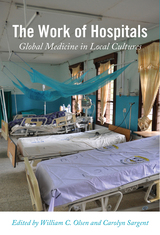2 books by Leatherman, Thomas L.

Building a New Biocultural Synthesis
Political-Economic Perspectives on Human Biology
Alan H. Goodman and Thomas L. Leatherman, Editors
University of Michigan Press, 1998
Anthropology, with its dual emphasis on biology and culture, is--or should be--the discipline most suited to the study of the complex interactions between these aspects of our lives. Unfortunately, since the early decades of this century, biological and cultural anthropology have grown distinct, and a holistic vision of anthropology has suffered.
This book brings culture and biology back together in new and refreshing ways. Directly addressing earlier criticisms of biological anthropology, Building a New Biocultural Synthesis concerns how culture and political economy affect human biology--e.g., people's nutritional status, the spread of disease, exposure to pollution--and how biological consequences might then have further effects on cultural, social, and economic systems.
Contributors to the volume offer case studies on health, nutrition, and violence among prehistoric and historical peoples in the Americas; theoretical chapters on nonracial approaches to human variation and the development of critical, humanistic and political ecological approaches in biocultural anthropology; and explorations of biological conditions in contemporary societies in relationship to global changes.
Building a New Biocultural Synthesis will sharpen and enrich the relevance of anthropology for understanding a wide variety of struggles to cope with and combat persistent human suffering. It should appeal to all anthropologists and be of interest to sister disciplines such as nutrition and sociology.
Alan H. Goodman is Professor of Anthropology, Hampshire College. Thomas L. Leatherman is Associate Professor of Anthropology, University of South Carolina.
[more]

The Work of Hospitals
Global Medicine in Local Cultures
William C. Olsen
Rutgers University Press, 2022
In the context of neoliberalism and global austerity measures, health care institutions around the world confront numerous challenges in attempting to meet the needs of local populations. Examples from Africa (including, Ethiopia, Ghana, and Congo), Latin America (Peru, Mexico, Guatemala), Western Europe (France, Greece), and the United States illustrate how hospitals play a significant role in the social production of health and disease in the communities where they are. Many low-resource countries have experienced increasing privatization and dysfunction of public sector institutions such as hospitals, and growing withdrawal of funding for non-profit organizations. Underlying the chapters in The Work of Hospitals is a fundamental question: how do hospitals function lacking the medications, equipment and technologies, and personnel normally assumed to be necessary? This collection of ethnographies demonstrates how hospital administrators, clinicians, and other staff in hospitals around the world confront innumerable risks in their commitment to deliver health care, including civil unrest, widespread poverty, endemic and epidemic disease, and supply chain instability. Ultimately, The Work of Hospitals documents a vast gulf between the idealized mission of the hospital and the implementation of this mission in everyday practice. Hospitals thus become “contested space” between policy and practice.
[more]
READERS
Browse our collection.
PUBLISHERS
See BiblioVault's publisher services.
STUDENT SERVICES
Files for college accessibility offices.
UChicago Accessibility Resources
home | accessibility | search | about | contact us
BiblioVault ® 2001 - 2024
The University of Chicago Press









